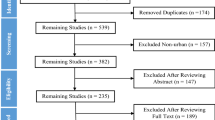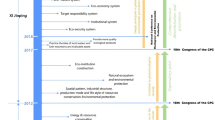Abstract
Global urban development is increasingly becoming an aspect of focus as nations fight sustainability challenges. A review of the current literature on urban sustainability suggests that research on development of cities, in both developed and developing countries, is growing fast, with an emphasis on sustainable development. However, very little of this research contains an integrated framework to systematically identify and examine the various dimensions of urban sustainability and to measure and evaluate them appropriately. Cities are more than the sum of their sectors, and are complex and interdependent systems on whose dynamics the quality of life of millions of human beings and a good part of the economy depend. Environmental, economic, social and governance problems can create formidable barriers to urban sustainability. Governance remains a critically important dimension of urban sustainability, especially when discussing urbanization in developing countries, given rapid population movements and imbalances in socio-economic development. Understanding how cities function is fundamental to resolving these imbalances. The aim of this paper is to provide a review and analysis of the concept of urban sustainability and to propose the development of a holistic framework through integration of environmental, economic, social, and governance dimensions of sustainability. Such a review would make it possible to understand the complex dynamics of the four dimensions and to assess the progress and challenges in moving towards urban sustainability, taking the case of Nairobi, Kenya, as an example. The paper argues that, for urban sustainability in developing countries, more emphasis should be placed on the governance dimension, because this is where the biggest challenge exists, with increasing needs for immediate management of rapid urbanization.





Similar content being viewed by others
References
African Development Bank (2011) Urban development strategy for African cities. African Development Bank, Tunis
Amis P (1995) Making sense of urban poverty. Environ Urban 7(1):145–157
Asian Development Bank (1991) The urban poor. Asian Development Bank, Manila
Becker CA, Morrison A (1994) Beyond urban bias in Africa. Heinemann, Portsmouth
Burgess R, Carmona M, Kolstee T (eds) (1997) The challenge of sustainable cities. Zed Books, London
Camagni R, Capello R, Nijkamp P (1998) Analysis towards sustainable city policy: an economy–environment technology nexus. Ecol Econ 24(1998):103–118
Castells M (1996) The rise of the network society. Oxford
Cheru F (2005) Globalization and uneven urbanization in Africa: the limits to effective Urban governance in the provision of basic services. Africa Studies Center, UCLA, California
Dauskardt RA (2007) Urban governance—setting the scene. Institute for Housing and Urban Development Studies, Rotterdam
Deakin M, Lombardi P, Mitchell G (2002) Urban sustainability assessment: a preliminary appraisal of current techniques. Urbanistica 118:50–54
Dwyer DJ (1972) The city as a centre of change in Asia, Hong Kong
Dwyer DJ (1975) People and housing in third world cities: perspectives on the problem of spontaneous settlements. Longman, London
Evans HE (1989) National development and rural–urban policy: past experience and new directions in Kenya. Urban Stud 26(2):253–266
Frenken K, Boschma RA (2007) A theoretical framework for evolutionary economic geography: industrial dynamics and urban growth as a branching process. J Econ Geogr 7(5):635–649
Government of Kenya (2008) National urban development policy, 2008. Government Printers, Nairobi
Government of Kenya (2010) Environmental Management and Co-ordination Act. Government Printers, Nairobi
Government of Kenya (2011) Urban Areas and Cities Act 2011, Nairobi
Hall PG (2000) Creative cities and economic development. Urban Stud 37(2000):639–649
Hanson R, Wolman H, Connolly D, McManmon R, Pearson K (2010) Corporate citizenship and urban problem solving: the changing civic role of business leaders in American cities. J Urban Aff 32(1):1–24
Hellström D, Jeppsson U, Kärrman E (2000) A framework for systems analysis of sustainable urban water management. Environ Impact Assess Rev 20:311–321
Holston J (2002) Urban citizenship and globalization. In: Scott AJ (ed) Global city-regions. Trends, theory, policy. Oxford, pp 325–348
http://www.statehousekenya.go.ke/government/ministries.htm, 2012 (Accessed Sept 2012)
Inter-American Development Bank (2011) Urban sustainability in Latin America and the Caribbean, Washington, DC
Kenya National Bureau of Statistics (2010) Kenya 2009 population and housing census, Nairobi
Kenya Open Data (2012) http://opendata.go.ke/ (Accessed April 2012)
Korff R, Rothfuß E (2009) Ambivalence of megacities: catastrophe or solution? Technikfolgenabschätzung in Theorie und Praxis 18(1):8–16
Low N, Gleeson B, Elander I, Lidskog R (eds) (2000) Consuming cities, the urban environment in the global economy after the Rio declaration. Routledge, London
Marcotullio PJ (2001) Asian urban sustainability in the era of globalization. Habitat Int 25(4):577–598
Mitullah W (2003) Understanding slums: case studies for the global report on human settlements, 2003—the case of Nairobi, Kenya. Earthscan, London
Moser C (1995) Urban social policy and poverty reduction. Environ Dev 7(1):159–171
Mutisya E, Yarime M (2011) Understanding the grassroots dynamics of slums in Nairobi: the dilemma of Kibera informal settlements. Int Trans J Eng Manag Appl Sci Technol 2(2):197–213
Ngau P, Kahiu N (2009) ISWM secondary data report on solid waste inventory in Nairobi: report of the National Technical Taskforce on preparation of an integrated solid waste management plan for Nairobi, Nairobi
Oxfam (2009) Urban poverty and vulnerability in Kenya. Place?
Shiroyama H, Yarime M, Matsuo M, Schroeder M, Scholz M, Ulrich AE (2012) Governance for sustainability: knowledge integration and multi-actor dimensions in risk management. Sustain Sci 7(Supplement 1):45–55
Spangenberg JH (2002) Development of institutional sustainability indicators. Sustain Dev 10(2):103–115
Ugwu OO, Haupt TC (2007) Key performance indicators and assessment methods for infrastructure sustainability—a South African construction industry perspective. Build Environ 42(2007):666–680
UN-HABITAT (2002) The global campaign on urban governance, concept paper, 2nd edn. UN-HABITAT, Nairobi
UN-HABITAT (2008a) State of the world’s cities 2008/2009: harmonious cities. London and Sterling. Earthscan, Virginia
UN-HABITAT (2008b) The state of African cities 2008: a framework for addressing urban challenges in Africa. UN-HABITAT, Nairobi
UN-HABITAT (2009) Urban indicators guidelines: better information, better cities, Nairobi
United Nations (2011) World urbanization prospects: the 2011 revision—highlights. Population Division, Department of Economic and Social Affairs United Nations, New York
United Nations Department of Economic and Social Affairs (2011) World urbanization prospects, the 2011 revision. United Nations Department of Economic and Social Affairs, Population Division, New York
USAID (1984) Urban development policy. USAID policy paper, Washington, DC
van Kamp I, Kees L, Gooitske M, de Hollander A (2003) Urban environmental quality and human well-being: towards a conceptual framework and demarcation of concepts; a literature study. Landsc Urban Plan 65(1–2):5–18
World Bank (2005) The urban transition in sub-Saharan Africa: implications for economic growth and poverty reduction. Africa Region Working Paper Series No. 97, The World Bank, Washington, DC
World Bank (2008) Cities of hope? Governance, economic and human challenges of Kenya’s five largest cities, Washington, DC
World Commission on Environment and Development (WCED) (1987) Our common future. Oxford University Press, London
World Urban Forum (2008) Government of Kenya country report to the 4th World Urban Forum, Nairobi
Wratton E (1995) Conceptualizing urban poverty. Environ Urban 7(1):11–36
Zellner ML, Theis TL, Karunanithi AT, Garmestani AS, Cabezas H (2008) A new framework for urban sustainability assessments: linking complexity, information and policy. Comput Environ Urban Syst 32(2008):474–488
Author information
Authors and Affiliations
Corresponding author
Additional information
Handled by Masafumi Nagao, UNU-Institute for Sustainability and Peace (ISP), International Christian University (ICU), Japan.
Rights and permissions
About this article
Cite this article
Mutisya, E., Yarime, M. Moving towards urban sustainability in Kenya: a framework for integration of environmental, economic, social and governance dimensions. Sustain Sci 9, 205–215 (2014). https://doi.org/10.1007/s11625-013-0223-7
Received:
Accepted:
Published:
Issue Date:
DOI: https://doi.org/10.1007/s11625-013-0223-7




